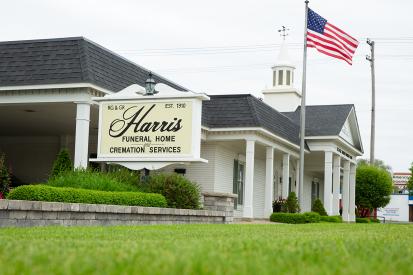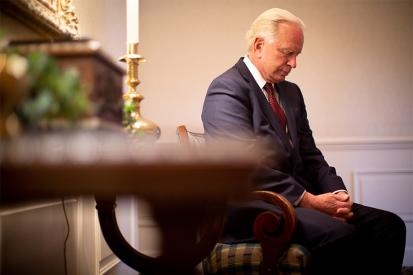What This Supreme Court Decision Changed for Harris Funeral Homes and All Americans


Tom Rost loves his job.
Day in and day out, he gets to be there for people who are going through one of the most difficult situations in their life—the loss of a loved one.
And at R.G. & G.R. Harris Funeral Homes, Tom wants to make sure that he gets everything exactly right for them. He and his staff meticulously plan every detail so that the families and friends they serve can focus on the grieving process.
Tom never imagined that this care and attention to detail would land him at the U.S. Supreme Court. Tom’s case was combined with two other cases under Bostock v. Clayton County and decided by the Court in June 2019.
Let’s take a look at this case below.

Who is Tom Rost, owner of R.G. & G.R. Harris Funeral Homes?
Harris Funeral Homes has been in Tom’s family for over 100 years.
Tom worked with his dad and uncle at Harris Funeral Homes when he was home for the summer during college. Eventually, he decided to attend mortuary school.
Tom has now owned Harris Funeral Homes for over 35 years, and he runs it alongside his son—making it a fifth-generation family business.
Tom views Harris Funeral Homes as his ministry, and he wants to ensure he is serving those who are grieving the loss of a loved one to the best of his ability. The mission of Harris Funeral Homes makes that clear:
Harris Funeral Homes recognize that its highest priority is to honor God in all that we do as a company and as individuals. With respect, dignity, and personal attention, our team of caring professionals strive to exceed expectations, offering options and assistance designed to facilitate healing and wholeness in serving the personal needs of family and friends as they experience a loss of life.
To that end, Tom does everything necessary to make sure the people Harris Funeral Homes serves feel welcome. He sweeps the floors, plants flowers, shovels snow, and changes lightbulbs. Often he will be the one to open the door and greet you with a smile as you walk into the funeral home.
Tom also follows up with each customer, calling to ask how they are doing and if he can help them in any way. And he really means it. At one point, a widow confided in Tom that she had no way to get to the grocery store. Tom promptly sent one of his employees to buy her groceries.
Tom is also continually looking for ways to improve the business and provide the best service possible. This includes everything from the smallest details, such as leaving a rose when a body is removed, to offering a grief counseling program for those who need it. Harris Funeral Homes also hosts an angel tree service every Christmas to honor those who died in the past year—which many families attend.
This level of service is what sets Harris Funeral Homes apart.
In 2011, Harris Funeral Homes was recognized by Preferred Funeral Directors International with the Parker Award for exemplary service. And in 2016, the Harris location in Livonia, Michigan, was recognized as the best hometown funeral home in the local newspaper.
Harris Funeral Homes v. Equal Employment Opportunity Commission (consolidated under Bostock v. Clayton County)
As a way to ensure that the families and friends of a deceased loved one can focus on processing their grief rather than on the funeral home and its employees, Tom asks each of his employees to agree to a code of conduct and sex-specific dress code.
But it’s that dress code that took Tom all the way to the U.S. Supreme Court in 2019.
Several years prior, the funeral home had hired a male funeral director who agreed to follow the sex-specific dress code at the time of hiring. But in 2013, nearly six years after being hired, that employee announced an intent to start dressing and presenting as a woman while working with grieving families. After carefully considering the needs of the funeral director, other employees, and his clients, Tom couldn’t agree to that. But then a government agency, the Equal Employment Opportunity Commission (EEOC), sued him for sex discrimination.
That’s when Alliance Defending Freedom stepped in to represent Tom and Harris Funeral Homes in court.
It should never have come to this. After all, Harris Funeral Homes acted in accord with existing laws, which allowed small businesses to have sex-specific dress codes. But the EEOC decided to take the law into its own hands—by redefining “sex” to include “gender identity.”
This drastic change could have widespread consequences for everyone, threatening not only small business but also privacy, dignity, and equal opportunity for women and girls.
That change would require employers to treat men who believe themselves to be women as if they are, in fact, women. It could allow for women’s scholarships to be given to men who believe themselves to be women. And it could force organizations to open women’s shelters, locker rooms, and restrooms to men who believe themselves to be women.
Those are just a few examples of many.
Case timeline
- June 2015: The EEOC filed a lawsuit against Harris Funeral Homes.
- August 2016: A federal court ruled in favor of Harris Funeral Homes, but the EEOC appealed the decision.
- March 2018: The U.S. Court of Appeals for the 6th Circuit reversed that decision, ruling against Harris Funeral Homes.
- October 2019: The U.S. Supreme Court heard arguments in Harris Funeral Homes and two other cases seeking to redefine “sex” to also include “sexual orientation.”
- June 2020: The Supreme Court ruled against Harris Funeral Homes in its Bostock v. Clayton County opinion. In doing so, the Court delivered a truly troubling decision: unelected officials and courts can effectively rewrite laws—forcing Americans to guess what the law means—including something as fundamental as the meaning of “sex.”
Outcome
Businesses have the right to rely on what the law is—not what government agencies want it to be—when they create and enforce employment policies.
Only Congress has the authority to change the law. Unelected officials, whether bureaucrats or judges, don’t have that power.
This was devastating news for Harris Funeral Homes, which has faithfully served grieving families for more than 100 years. But this ruling has negative implications for all Americans.
Redefining “sex” to mean “gender identity” creates chaos, with widespread consequences for everyone:
- It undermines dignity, privacy, and equal opportunities for women.
- It could compel professionals from all walks of life to refer to colleagues with pronouns and other sex-specific terms according to gender identity rather than biology.
- It puts employers like Tom in difficult positions—requiring them to treat men who believe themselves to be women as if they are in fact women, even if that results in violating the bodily privacy rights of other employees.
The bottom line
Neither government agencies nor the courts have authority to rewrite federal law by replacing “sex” with “gender identity”—a change with widespread consequences for everyone.
Learn more:
Tom Rost of Harris Funeral Homes shares his story:
ADF Senior Counsel John Bursch explains the Court’s ruling in Harris Funeral Homes and its combined case Bostock v. Clayton County:
